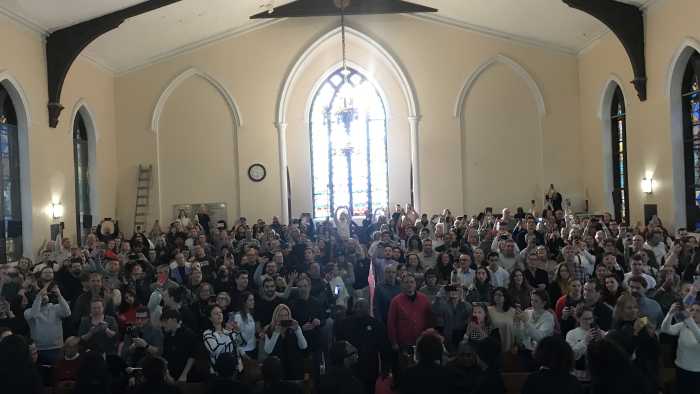By Lincoln Anderson
No camping.
That was the word from the Parks Department last week to local activists who applied for a permit for 20,000 expected protesters to pitch tents in Tompkins Sq. Park or East River Park during the Republican National Convention.
City parks have evening curfews. That was basically the reason Megan Sheekey, a Parks spokesperson, gave for the denial of the application, which was for two weeks, from Aug. 27-Sept. 12.
“We do not permit events after the parks are closed,” Sheekey said.
The application, along with a $25 permit fee, was filed two weeks ago by East Village activist John Penley and Aaron Kay, also known as the Yippie Pie Man.
Penley expected they wouldn’t be notified until the last moment, but would ultimately get the permit. So he was surprised to get a call from the Parks commissioner’s office last Thursday morning informing him the permit had been denied. He said the official told him they could appeal the decision through the department’s appeal process, which is what they plan to do.
Penley said Parks is making a mistake not to provide a camping area for the droves of protesters who will descend on the city without places to stay.
“If they don’t grant it, then I’m going to wash my hands of it,” said Penley. “They can deal with thousands of protesters camping out unauthorized in Central Park. If they decide to change their mind — and it would be in their best interest — I’ll be willing to work with them.”
He said because of the “historical nature” of Central Park having been used as a camping ground during past New York City political conventions, that’s where protesters will gravitate, but that they’ll also likely try to crash in parks all over the city.
Penley said he called Parks Commissioner Adrian Benepe, asking to meet, but Benepe never took him up on it. Penley was disappointed at the permit’s quick denial.
“I thought they would spend a little more time considering it,” he said. “They probably only had [the application] for a week or so before they denied it.”
Perhaps precipitating Parks’ decision, Penley suspects a USA Today columnist who was planning to run an item on the campout plan called the department, which, to keep the story from going national, decided to promptly issue the denial.
Penley added that letting the protesters sleep in Tompkins Sq. Park or East River Park would boost the local economy.
“We think it would be great for all the businesses on the Lower East Side,” he noted, “the delis, the bars.”
He said if the appeal fails, then a week before the R.N.C. they plan to hold a 24-hour sleep-in outside Mayor Bloomberg’s Upper East Side townhouse, demanding the city open East River Park to the protesters for at least the duration of the convention.
“What are the city’s contingency plans for these thousands of protesters?” Penley asked.
Kay, known for having pelted Phyllis Schlafly and G. Gordon Liddy with pies, said he’ll refrain from launching any desserts over the denial, instead pinning his hopes on Parks’ appeal process.
“The city blew a chance of something happening in the spirit of cooperation,” he said.
Kay cited successful past convention campouts, such as Miami Beach during the 1972 Democratic and Republican national conventions, where thousands bedded down outside, with the city even providing portable toilets.
During the 1992 Democratic Convention in New York City, Kay said, protesters had a “mini-encampment” near Central Park’s Sheep Meadow, though Betsy Gotbaum, then Parks commissioner, had told them no.
“People did it anyway and the N.Y.P.D. gave no problems,” he said.
Penley said he camped in Central Park with protesters during the 1980 Democratic Convention.
Told of the activists’ mention of past convention campouts, Sheekey responded in an e-mail: “You’re telling me they said they camped in a remote area of the park 24 years ago (possibly illegally), so we should grant them a permit for a 20,000-person encampment today?”
But Kay said this promises to be the mother of all convention protests.
“This could be big,” he said. “Things are polarized. It’s like the two Americas facing off. This is the Great American Face-off.”






































